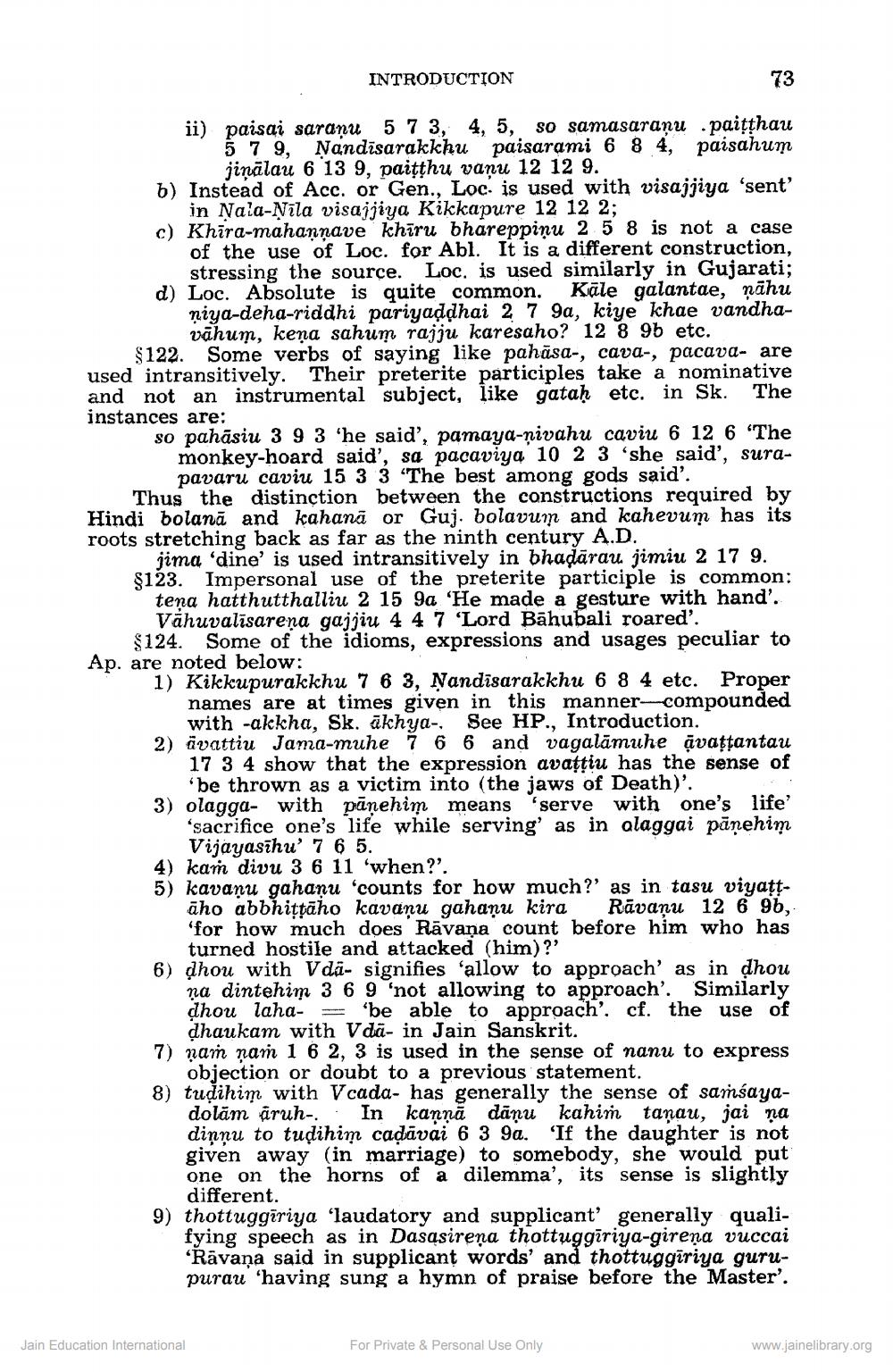________________
INTRODUCTION
73
c)
ii) paisai saranu 5 7 3, 4, 5, so samasaraņu paiţthau
5 7 9, Nandisarakkhu paisarami 68 4, paisahum
jinālau 6 13 9, paitthu vanu 12 12 9. b) Instead of Acc. or Gen., Loc is used with visajjiya 'sent'
in Nala-ķīla visajjiya Kikkapure 12 12 2; Khira-mahannave khīru bhareppinu 2 5 8 is not a case of the use of Loc. for Abl. It is a different construction,
stressing the source. Loc. is used similarly in Gujarati; d) Loc. Absolute is quite common. Kale galantae, nähu
niya-deha-riddhi pariyaddhai 2 7 9a, kiye khae vandha
vāhum, kena sahum rajju karesaho? 12 8 9b etc. $122. Some verbs of saying like pahāsa-, cava-, pacava- are used intransitively. Their preterite participles take a nominative and not an instrumental subject, like gataḥ etc. in Sk. The instances are:
so pahāsiu 3 9 3 'he said', pamaya-nivahu caviu 6 12 6 "The
monkey-hoard said', sa pacaviya 10 2 3 'she said', sura
pavaru caviu 15 3 3 "The best among gods said'. Thus the distinction between the constructions required by Hindi bolana and kahanā or Guj. bolavum and kahevum has its roots stretching back as far as the ninth century A.D.
jima 'dine' is used intransitively in bhadārau. jimiu 2 17 9. $123. Impersonal use of the preterite participle is common:
tena hatthutthalliu 2 15 9a 'He made a gesture with hand'.
Vähuvalīsarena gajjiu 4 4 7 'Lord Bāhubali roared'.
$124. Some of the idioms, expressions and usages peculiar to Ap. are noted below:
1) Kikkupurakkhu 7 6 3, Ņandisarakkhu 6 8 4 etc. Proper
names are at times given in this manner--compounded
with -akkha, Sk. ākhya- See HP., Introduction. 2) avattiu Jama-muhe 7 6 6 and vagalāmuhe avatpantau
17 3 4 show that the expression avattiu has the sense of
be thrown as a victim into the jaws of Death)'. 3) olagga- with pāņehim means 'serve with one's life'
'sacrifice one's life while serving as in alaggai pāņehim
Vijayasīhu' 7 6 5. 4) kam divu 3 6 11 'when?'. 5) kavanu gahanu 'counts for how much?' as in tasu viyaţt
āho abbhittāho kavanu gahanu kira Rāvaņu 12 6 9b, 'for how much does Rāvaņa count before him who has turned hostile and attacked (him)? dhou with Vdā- signifies allow to approach' as in dhou na dintehim 3 6 9 'not allowing to approach'. Similarly dhou laha- = 'be able to approach'. cf. the use of
dhaukam with V da- in Jain Sanskrit. 7) nam nam 1 6 2, 3 is used in the sense of nanu to express
objection or doubt to a previous statement. 8) tudihim with Vcada- has generally the sense of samsaya
dolām áruh-. In kannā dāņu kahim tanau, jai na dinnu to tudihim cadāvai 6 3 9a. 'If the daughter is not given away (in marriage) to somebody, she would put one on the horns of a dilemma', its sense is slightly different. thottuggiriya 'laudatory and supplicant' generally qualifying speech as in Dasasirena thottuggiriya-girena vuccai “Rāvana said in supplicant words and thottuggiriya gurupurau 'having sung a hymn of praise before the Master'.
Jain Education International
For Private & Personal Use Only
www.jainelibrary.org




